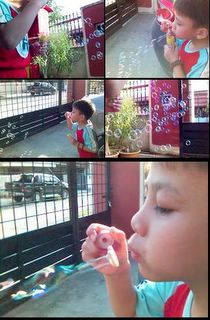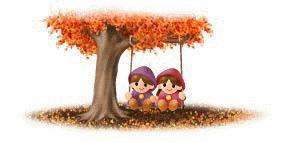One of my standard 1 student informed me that now already the seventh month of the lunar calendar. This cute little boy added: "Teacher, my mother told me ghosts come in this month!" Then the others boo and hoot. "Stop talking about ghost!" "Don't gossip nonsense, ghost doesn't exist in this world!"
I observed quietly. I knew some of them are scare to talk about this topic. As for myself, I also don't know how to asnwer their ten thousand questions! They are just so interested to know more about the ghost.
About the Ghost Month
The seventh month of the lunar calendar is commonly called Ghost Month by Han Chinese people, and the "Pudu" rite in the middle of this month is an important sacrificial ceremony in Han society, when we offer sacrifices to those roaming dead souls who cannot be reincarnated, and who have no one to offer sacrifice to them...
The highest deity in the celestial world is the Jade Emperor, and after him come deities such as Kuanyin and Matsu. At the bottom of the pile is the God of the Earth. People sacrifice to their ancestors, and the wandering souls are those who have no descendants to sacrifice to them. Because wandering souls have no one to offer them sacrifice, they are a major source of social unrest in Han belief.
The Pudu rite blends Taoist and Buddhist belief
The Pudu rite, or "Universal Salvation," held in the seventh month, was developed to deal with the wandering souls, cause of so many problems in society, to help settle these demons in hell who have no one to sacrifice to them. These days, the Pudu rite blends not just Han beliefs about spirits and dead souls, but also Taoist and Buddhist thought, and so it's often called the "Chungyuan Pudu" or the "Ullambana Rite." The name "Chungyuan Pudu" is related to Taoist thought. In the Taoist pantheon, there are the Three Officials, of the sky, the earth and the waters. The Earth Official is in charge of absolution, and on the 15th day of the seventh month in the lunar calendar (the day known as Chungyuan), which is his birthday, he comes down to be among mortals, and decides who is good and who is bad, who will have suffering and who will have good fortune. The wandering souls were thought to have committed greater sins, and so Taoist priests are sent for to perform the "Ke Yi," a discipline rite, and thereby rescue these lonely souls. "Ullambana" is a Sanskrit word which means to offer food to the souls of the dead and rescue them from their suffering, and is what the Buddha told his disciple, Mahamaudgalyayana. He told him that on the 15th day of the seventh month, he should go with basins full of "hundreds of flavors and the five fruits," and offer them to the greatly virtuous assembled Sangha of the ten directions, and thus save his mother from the way of the hungry ghosts. Thanks to the mixing of Buddhism and Taoist thought, Chungyuan Pudu has two different Buddhist and Taoist rites.
The Pudu rite can be split up into the following parts: inviting the ghosts, offering them food, reciting sutras, then driving the ghosts away again. Inviting the ghosts involves opening the ghost gate, and inviting the wandering souls to come up from the underworld into the light. So that the horde of ghosts can have a smooth passage from the gloomy underworld up into the world of mortals, people erect lantern poles in front of temples and hang lanterns, "celebrate Chungyuan" as mentioned above, and guide the ghosts. The higher the lantern poles, the larger the area they light up, and so the more lonely ghosts that can be fed. For this reason, each temple must consider the amount of feeding they can provide, so as to avoid having "too many ghosts and too little gruel" and angering the ghosts into bringing misfortune on humans. Apart from the lantern poles erected on the ground, there is also a ceremony where water lanterns are set on the water, lighting the way for the souls of the drowned. Fearing that the ghosts may be afraid of the world of mortals and will not be able to eat their fill, so cautious towns such as Lukang have patrols that take it in turn to offer sacrificial food each day, after the ghost gate has been opened, so as to keep things safe.
The offering of food
The offering of food is the most important rite in the Pudu, and believers make sacrifices of rich dishes to sate the lonely ghosts' appetites. Apart from food, people also prepare new clothes to allow their passage into the world to be a comfortable one. Because of the discipline rite performed by the priest, believers think that the food for the hordes of ghosts will bring them good luck if they eat it, and so people compete for the food offerings in the "chiang gu" activity, the liveliest scene in the Pudu rite. Apart from the offering of food, people also recite sutras for the wandering souls, so that they can cross over into paradise. The end of the Pudu rite is the "closing of the ghost gate" on the 29th day of the seventh month of the lunar calendar, and at dusk on that day, people prepare cooked food outside the doors of their homes as a "farewell dinner" for the lonely ghosts, and the lantern poles in front of the temples are dismantled, announcing the end of the Pudu rite. Sometimes, fearing that the lonely ghosts will be unwilling to return to the underworld, and will harm mortals, temples will invite Chung Kuei (a special deity who protects humans from evil spirits) to escort the ghosts, and in this way keep the locality safe and peaceful.
The special significance of wandering souls in Taiwanese society
The Pudu rite of the seventh month has traditionally been more important in Taiwanese society than it was in the original settlers' old hometowns back in China. From the seventeenth century, Han people took the dangerous risk of coming to Taiwan to develop the land, and put their lives at the mercy of poisonous snakes, fierce animals, pestilent diseases, backbreaking toil, mob fights and popular uprisings. The old adage "nine deaths, one life" [meaning a situation so dangerous that it would kill nine out ten people] explained the tricky job of fighting to stay alive. Everywhere, the remains of the dead who had no one to bury them created an atmosphere of intense fear about ghosts for the settlers. But these wandering souls of the dead from other places had many brothers from their hometowns, and prompted by religion and pity, people raised funds to bury these exposed remains, and this created the phenomenon in Taiwan of densely-packed graveyards for the unclaimed dead. In the small area of Mucha, Taipei, there are 26 such memorial temples. Because these wandering souls who had died in this foreign land of Taiwan were taken care of like brothers by other settlers here, the Pudu rite in the seventh month was given the name of "honoring our brothers," rather different from the "honoring strangers" which took place back in China.
The connecting medium of interpersonal networks
If we look at the history of the development of Taiwanese society, the Chungyuan Pudu ceremony became and important medium for connecting interpersonal relationships in the regions of Taiwan, from the seventeenth century onwards. Many of these "good brothers" of the Chungyuan Festival lost their lives protecting their villages and defending the people there. In an age where consciousness of one's hometown identity was intense, people with different hometown identities would, through the Chungyuan Festival ceremony, form their own groups, mutually unite, and become a common body against their enemies. The Pao An Temple at Talungtung in Taipei was the center for the Chungyuan Festival rites for descendants of settlers from Tong'an County in Fujian Province, China, and within the Taipei Basin, three groups of Tong'an County descendants would take it in turns to preside over the Chungyuan ceremony. The Lungshan and Chingshui temples in Manka (Wanhua), were the center for ceremonies for the descendents of immigrants from Sanyi (the three Fujian counties of Nan'an, Jinjiang and Hui'an) and Anxi county in Fujian Province. Yimin Temple in Fangliao, in Hsinpu Township, Hsinchu County, is the center of the Chungyuan Festival ceremonies for Hsinchu Hakkas, and at the time of Lin Shuang-wen and Tai Chao-chun's anti-Qing revolts during the Qing Dynasty, the ceremony was carried out for countryfolk who sacrificed their lives for their hometowns. Qing officials bestowed upon them the name of the "Yimin men" [roughly translatable as "justice men"] on these anti-Qing resisters in order to placate the local people.
Giving the name "honoring brothers" to Taiwan's seventh month Pudu rite has its own special historical background. Apart from religious significance, the seventh month Pudu rite was the most important medium linking communities together in north and central Taiwan in the nineteenth century. If people could take the enthusiasm from the "honoring brothers" ceremony in the seventh month and apply it to helping their more unfortunate brothers, then they could reduce the number of wandering souls.
 Um, I love my bed... So cozy *haha*
Um, I love my bed... So cozy *haha*  I'm glad that I had met someone nice in my life besides of those bad one who always speaking ill of me. She is a kind girl who always teach me and help me. Always be my driver, fetch me back when I need her help. A very kind and understanding person. I'm glad I had know her. *Thanks for being my friend*
I'm glad that I had met someone nice in my life besides of those bad one who always speaking ill of me. She is a kind girl who always teach me and help me. Always be my driver, fetch me back when I need her help. A very kind and understanding person. I'm glad I had know her. *Thanks for being my friend* My friend bought herself a new mobile yesterday. Her Sony Ericsson K700i looks cool! I love it very much. Now I have the thought of changing my mobile too! Why not?! This phone's price had become lower. It was RM1200 few months ago but now with RM750 you can own one. The price is reasonable as it contains a lot of functions. A very useful phone model for me.
My friend bought herself a new mobile yesterday. Her Sony Ericsson K700i looks cool! I love it very much. Now I have the thought of changing my mobile too! Why not?! This phone's price had become lower. It was RM1200 few months ago but now with RM750 you can own one. The price is reasonable as it contains a lot of functions. A very useful phone model for me.  Harry Potter and the Half-Blood Prince - JK Rowling does it again!
Harry Potter and the Half-Blood Prince - JK Rowling does it again! 
























